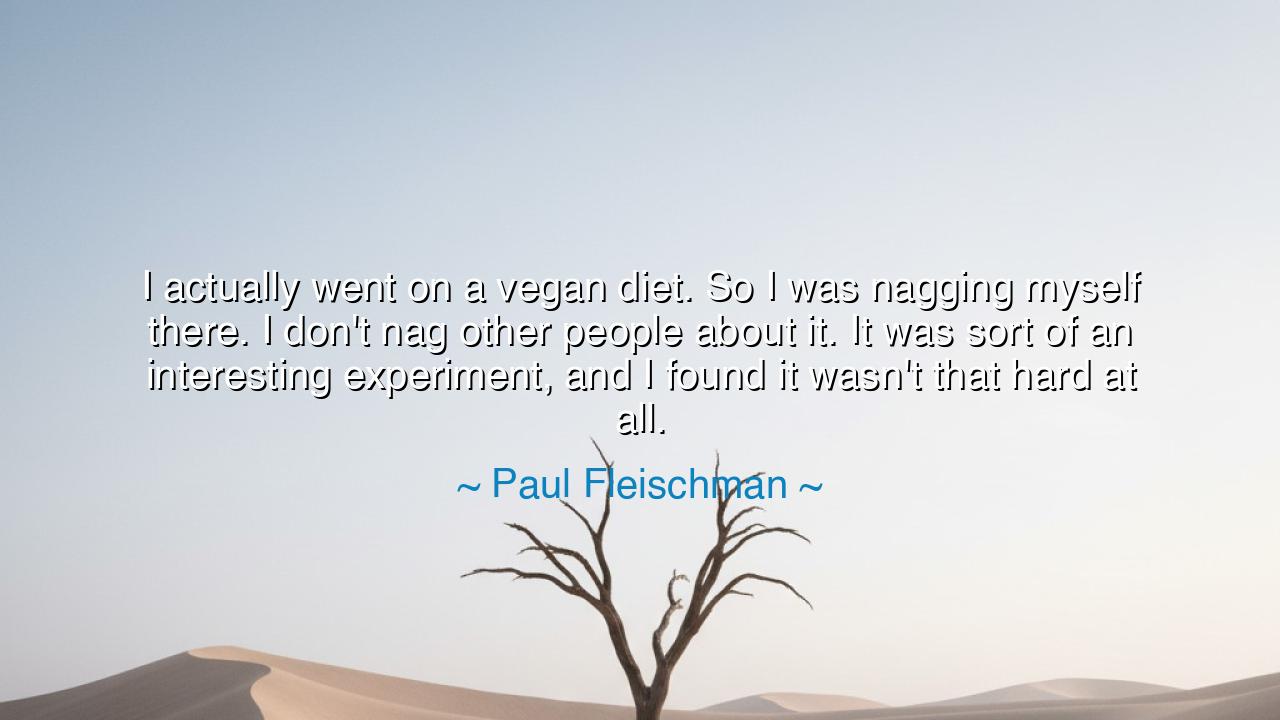
I actually went on a vegan diet. So I was nagging myself there. I
I actually went on a vegan diet. So I was nagging myself there. I don't nag other people about it. It was sort of an interesting experiment, and I found it wasn't that hard at all.






The words “I actually went on a vegan diet. So I was nagging myself there. I don't nag other people about it. It was sort of an interesting experiment, and I found it wasn't that hard at all.” by Paul Fleischman are not merely about food — they are about discipline, curiosity, and humility. In these lines, Fleischman speaks not as a preacher but as a seeker, one who tests the boundaries of comfort to discover something deeper about himself. His choice to embark on a vegan diet was not driven by vanity or ideology, but by an inner calling to learn — to see how far self-awareness and compassion could extend into the smallest acts of daily living. His words echo the timeless wisdom of those who understood that mastery of the self begins not with grand gestures, but with small, deliberate choices.
When he says “I was nagging myself there,” Fleischman reveals one of the great paradoxes of self-discipline: that the hardest person to lead is oneself. The ancients taught that self-restraint is not about denial, but about liberation — freeing the spirit from the tyranny of impulse. In “nagging” himself, he was, in truth, awakening a dialogue between desire and wisdom. He became both the teacher and the student within his own life. This inner conversation is the foundation of all growth. To change what we eat is to change how we think, for eating is the most intimate act of survival, the bridge between the body and the earth.
His words “I don’t nag other people about it” shine with humility — a virtue rarer than ambition. Too often, those who find a path mistake discovery for superiority. Fleischman’s restraint shows the mark of true wisdom: he understands that transformation cannot be forced upon others; it must arise from within. The ancients believed that virtue loses its power when wielded as a weapon. The Stoic philosopher Epictetus taught, “Do not explain your philosophy. Embody it.” Fleischman’s quiet example follows this ancient rule. By living his values without preaching them, he honors the dignity of choice — both his own and others’.
The idea of a vegan diet in his words carries symbolic weight beyond nutrition. It is a metaphor for mindful living — the recognition that every action ripples outward. To choose what we eat with intention is to acknowledge our place in the web of life. Fleischman’s tone is neither militant nor ascetic; it is curious, almost playful. He calls it “an interesting experiment,” and in this lies the secret to all great discoveries: the willingness to explore without fear. The ancients revered such experiments as sacred — the act of living as inquiry, of testing one’s convictions in the crucible of experience.
When he says “I found it wasn’t that hard at all,” he shatters the illusion that change must always be a battle. Too often we dread transformation, imagining it as a loss. But Fleischman shows that when intention is aligned with understanding, change becomes natural, even joyful. The philosopher Lao Tzu once wrote, “The journey of a thousand miles begins with one step.” Fleischman’s step was small — a shift in diet — yet its meaning is profound. It teaches that the path of wisdom often begins with curiosity rather than conviction, and that sometimes the barriers we fear are illusions we create ourselves.
Consider the example of Pythagoras, the ancient Greek mathematician and philosopher, who centuries before Fleischman adopted a plant-based diet not as dogma, but as devotion. He believed that purity of mind required purity of body, and that compassion for living beings elevated the soul. His followers did not see their choices as restrictions but as acts of reverence — each meal a prayer of alignment with the cosmos. Fleischman’s modern experiment reflects this same lineage of thought: that food, when approached with mindfulness, becomes philosophy in action.
And so, dear listener, take this lesson to heart: live as an experimenter of your own soul. Do not fear the small changes that call you, for they may lead to great awakenings. When you seek transformation, begin not with judgment, but with curiosity. Test your habits gently, observe yourself honestly, and celebrate your discoveries quietly. As Paul Fleischman teaches, self-discipline need not be harsh, and compassion need not be loud. The true path of wisdom is both humble and joyful — a series of small, conscious choices that bring the body, the heart, and the spirit into harmony with the life that sustains them all.






AAdministratorAdministrator
Welcome, honored guests. Please leave a comment, we will respond soon